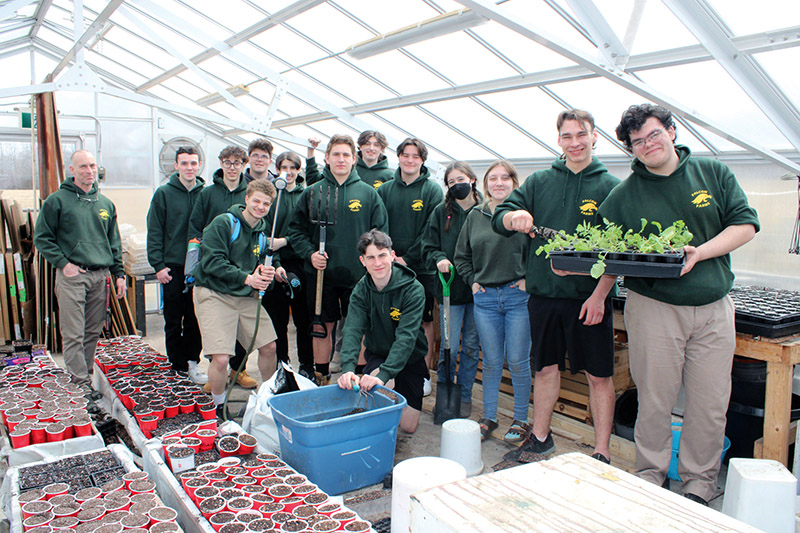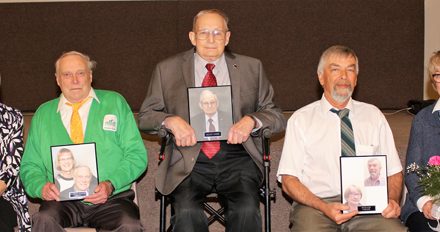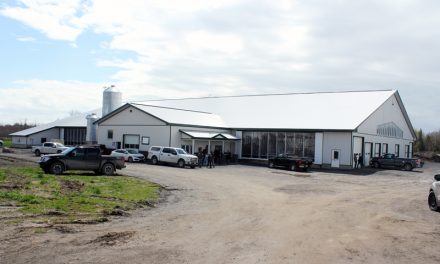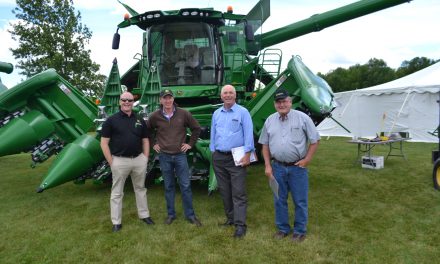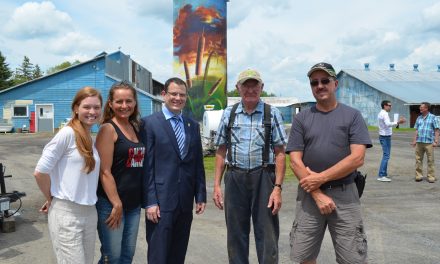With their teacher Michael Smith, students in the agricultural SHSM at Holy Trinity gather for a photo in the school’s greenhouse during their class. In no particular order Benjamin Kisnics, Ayden Vandeligt, Simon Allard, Quinton Gougeon, Simon Taylor, Titus Mason, Declan McDonald, Zach Dixon, Eric Baron, Brayden Demers, Grace O’Hara, Isabella Spinellina and Brady Boudreau. Thompson Goddard Photo
EASTERN ONTARIO – An increased interest in purchasing locally grown food combined with learning about the production of the food we consumed, has led to people of all ages and backgrounds learning more about the role of agriculture in our society.
Many secondary schools in Eastern Ontario offer an Agricultural Specialist High Skills Major (SHSM) to provide students with the opportunity to learn about food production and begin the development of skill sets required for the sector.
The government of Ontario website explains the Specialist High Skills Major (SHSM) is a Ministry of Education approved program providing students with the opportunity “to gain credits towards their Ontario Secondary School Diploma and focus their learning on a specific economic sector at the same time.”
Program Leader for Science and Special Education at North Dundas District High School Jennifer Onstein explained there are several advantages to students participating in a SHSM program. These include the ability to “customize their secondary school education to suit their interests and talent, develop specialized knowledge and skills that are valued by the sector and post secondary education institutions,” as well as refining career goals and making informed decisions about their future.
There are 19 SHSM programs, which include business, construction, food processing and agriculture, with students who successfully complete the eight to 10 courses in the field, earn industry certifications and gain skills through placements are eligible to “receive the SHSM seal on their diploma.” In grades 7 to 10, students who may be interested in enrolling in a SHSM program, are able to access information on career possibilities and courses to take to prepare for enrolment in a SHSM program in grades 11 and 12.
The SHSM-Agriculture program provides for students to receive skills and knowledge in the agricultural field, while at secondary school and assist in those entering post secondary studying or direct entry into the workplace.
Students in the agricultural SHSM program are required to complete four agriculture credits in Grade 11 and 12, three other credits from the Ontario curriculum and two cooperative education credits, as well as completion of a specified number of compulsory and elective certifications in the agricultural field.
Holy Trinity Catholic Secondary School in Cornwall and North Dundas District High School, located midway between Winchester and Chesterville, Ontario are two of several Eastern Ontario secondary schools that offer students the opportunity to enrol in an agricultural SHSM program.
Michael Smith is the Agricultural SHSM teacher at Holy Trinity Catholic Secondary School located on the outskirts of Cornwall on 43 acres of land. As the operator/owner of a small farm, Smith is deeply committed to informing others “about the importance of agriculture.” Training for teaching the agricultural SHSM included attending meetings, mentorship from the NDDHS agriculture, SHSM teacher and a SHSM supervisor to provide guidance.
“There isn’t any special training to be a SHSM educator. It takes a lot of enthusiasm, organization, and innovation,” said Onstein, continuing in the Upper Canada District School Board, SHSM teachers are supported by a Learning Partner who “help guide the educator in the different responsibilities of a SHSM teacher commented Smith.
Smith explained “Nothing is more important to society than the production of food.” He went on to say the agricultural SHSM program provides information and hands on experience on the work done by those in this sector to provide food to people. Learning outcomes of the program include learning about agricultural business and cultivation practices, developing the skills needed by hands-on experiences and to “create opportunities for students to choose working in the Ag sector in the future,” explained Smith.
The students in the program at Holy Trinity come from both rural and urban communities and register for the program in accordance with ministry requirements. Smith noted the students then register for one of three classes, Green Industries, Resource Management or Environmental Science. Registration in these classes provide students the opportunity to work in the school’s greenhouse, vegetable gardens, fruit orchard and compost stations. Past visits have been made to local dairy, goat, and vegetable farms as well as a trip to the Macdonald College in Ste Anne De Bellevue in Quebec, said Smith.
Students enrolled in the Agriculture SHSM at North Dundas District High School visited the Perth Campus of Algonquin College in Perth, where they met students and staff, saw demonstrations, and monitored a class. They have visited several agricultural events including the Dundas Farm Show, Oschmann Forest Conservation Area, The Royal Agricultural Winter Fair and the International Plowing Match. Onstein explained experts have visited the school to help students complete their certifications.
“The 4.4 acres that Falcon Farms sits on, was designed by a permaculture/sustainability expert. From his plans, the students built the 100+ mulched vegetable gardens; the raised beds, the fruit orchard, compost station, built bird/bat homes; built vegetable stand and chicken coops and have planted over 3,000 trees,” said Smith. As part of the learning experience, students “plan their gardens, order seeds, start seedlings, plant/maintain and harvest produce for sale or use in foods/hospitality classes.” He noted the pandemic had led to unrestrained weed growth in their onsite gardens, as students were unable to attend the school in person but anticipates this will be brought under control this year.
“Not all students learn best in a classroom; many like to work on projects outside and see the results of their labour. I see joy and excitement when their plants begin to grow and when they get to taste the fruits of their labour,” said Smith when asked about the importance of this program, continuing “Most people have no idea what it takes to produce the food they eat – my students do.”
Last year, Agriculture SHSM students and leadership students tapped 35 maple trees at NDDHS, with agricultural SHSM students building the sugar shack in their construction class. “Staff from South Nation Conservation came to the school to teach the students about tree identification, sustainable resource management, the history of maple syrup making and how it reflects Indigenous traditional knowledge and maple syrup operations. The students also visited the Oschmann Forest Conservation Area to learn about a large-scale maple sap collection site,” explained Onstein, noting 40 litres of maple syrup was produced which was shared with students and staff and the program continues this year using a reverse osmosis system.
A visit to Falcon Farms on a warm, spring day provided the opportunity to see the students busy in a variety of activities. “I like seeing kids getting energized by growing things,” commented Smith, and there was certainly a sense of collaboration and excitement as students busily began sowing seeds in the greenhouse and making plans for the coming growing season.
Throughout the area, there is a sense of collaboration between the agriculture SHSM staff and students and the community in which they live. Craig Stevenson, who teaches the Agricultural SHSM at Tagwi Secondary School, was awarded the 2022 Award of Merit during the Celebration of Stormont Agriculture event in Avonmore on March 31. In an address from Stevens, read by Charity Stucki who received the award on his behalf, he commented on the importance of educating students about agriculture in an area where agriculture is an integral part of the community.

